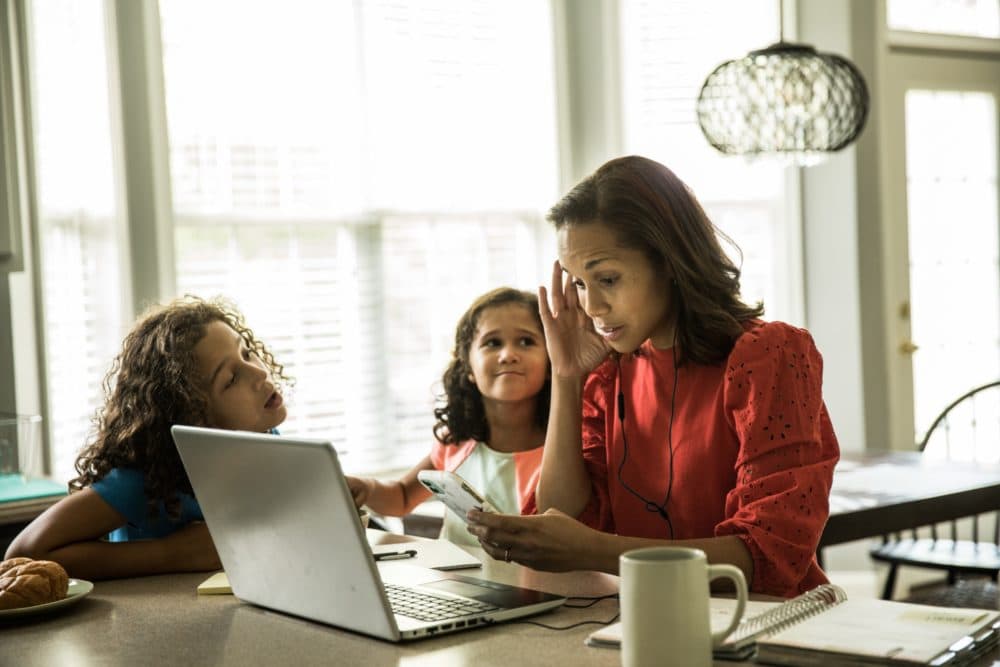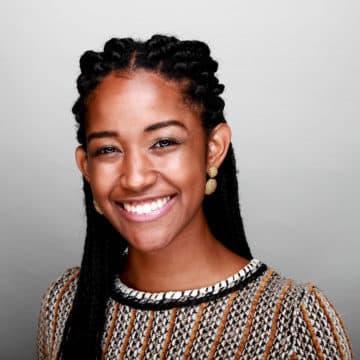Advertisement
How The Pandemic Has Tipped The Balance Between Work And Motherhood
Resume
With the pandemic projected to set women back a decade in the workplace, we take listener calls and talk with two working mothers about how their lives have been affected this past year.
We're joined by Quiana Agbai, a Boston parent, entrepreneur, and author of the blog and Instagram account "Harlem Love Birds"; and Jennie Weiner, a Somerville parent and associate professor of Educational Leadership at the University of Connecticut.
Interview Highlights
On what it's been like to be working moms during the pandemic, and how it has changed over the course of the past year:
Agbai: "I think there's been a lot of back and forth as far as managing just the family and work life. And I think where we're at currently with schools starting to bring children back in, or are planning to, it's another moment where I feel as a parent, I'm kind of holding my breath and figuring out, 'OK, how do I need to navigate, how do things need to switch around?' So it still feels like there's a lot of flux one year later."
Weiner: "It's been tremendously difficult. I've been working full time, as my husband has. We've been trying to manage everything that our school district has been providing for our students. We have twin 9-year-old boys and we're so grateful for that, but to attempt to work full time and have one boy on the left and one on the right, it's been a lot. I've tried to hold on to ideas about grace — giving myself grace and giving them grace, given the unprecedented events — but we're really worn out. We're all feeling it acutely. And I think holding our breath is definitely something we're doing in our household as well. I didn't want this time to change the parameters of my relationship with my kids and change me from a mother and someone trying to give care and comfort during this time into an officer sort of overseeing and keeping them on track. And unfortunately, I think those things have sometimes blended in ways that haven't been the best for our family. But we're chugging along and we're trying to maintain hope and good humor as we go."
On taking care of their own mental health, and their kids' mental health:
Agbai: "[On the point] of managing those relationships within the family, it's been a real challenge for me. And I know in the past when we've spoken before, I've talked about the importance of maintaining therapy throughout all of this. And so being able to make that priority has been important. And I know there's been just in general in our culture lately, this talk on the importance of mental health and accessibility to mental health. And that's something that I've been paying a lot more attention to and even for my own children, staying on top of their mental well-being. And I think prioritizing that, yes, we are doing our school work and doing the best we can. But I think long term as a parent, I'm thinking about what are the long term implications of this year and what does this possibly look like on the flip side when we come out of it?"
"As a parent, I'm thinking about what are the long term implications of this year and what does this possibly look like on the flip side when we come out of it?"
Quiana Agbai
Weiner: "We've tried to get outside when we can, be grateful when we can, express gratitude when we can. I think this is an ongoing question. You know, I think one of the things we all are hoping for is an idea of certainty. ... So I'm just trying really hard to focus on what I can control today or even in this moment and doing the best that I can. And if something doesn't go well to forgive each other and to forgive myself and try better tomorrow, because long term planning, if anything, this year has taught me, can disappear quite quickly. And flexibility is something that I'm working on and I'm trying to, you know, create among my children. I have also, I would say to just as a more positive note, been so incredibly moved by their resiliency. I mean, the idea that we would be a year and not entering a school building and that they would continue to get up every day and try the best they can is a revelation and a good lesson for me as well."
On the disproportionate amount of caregiving women do at home:
Weiner: "I think one really important thing to think about or talk about is that like so much inequity, COVID didn't create it. It uncovered the invisibility or the often invisibility for many women and the ways in which sort of discriminatory structures impact their lives. ... When we think about this, what we have to understand is that these were structural issues that were true before and they will be true after. And in order for us to kind of we have to renegotiate and rethink these systems, whether they be intimate partner systems and how the balance of work and what that work looks like within the context of the home or around employers and fair wages and including things like a fair minimum wage, which, of course, you know, most low wage earners are women and women of color. And so these are feminist issues that need to be attended to to make women and working women's lives better. And, in so doing, families lives better over time."
On long-term fixes to the inequitable choices that working mothers face:
Agbai: "I think we can't do it alone. I think there's been so many conversations swirling among caregivers and I think specifically women, that sometimes it ends up sounding like we're in an echo chamber. So I think it's really important to bring people into the conversation within the community if it's your extended family, even letting your children know, like I even communicate with my children, let them know, 'Look, this is what mom is struggling with right now.' And there's a lot going on. And I think beyond just building that empathy and making sure the conversations are not just happening among us, being able to see who else is in my sphere that I can call in. You know, one of the silver linings of remote learning, having both of my children here today was the ability to see Mayor Janey get sworn in. And what does that mean when she talks about fixing these issues on a local level and bringing equity within the community. So I think there's ways that we can be in communication with our immediate lawmakers, our leaders, and also to call in others who may not necessarily be caregivers, but may be caregiver adjacent."
"Like so much inequity, COVID didn't create it. ... We have to understand that these were structural issues that were true before and they will be true after."
Jennie Weiner
On what progress to hope for after the pandemic:
Agbai: "I think there's the opportunity to realize now that we've named it and called it out, like how Jennie expressed. I think there's the flexibility not to have trepidation bringing it up or asking your employer or asking for those in your circle to give you that flexibility. And I think that now we've had the language and we've seen what's possible. ... This has been a period of empathy building and giving language and ways for us to rebuild structures that we didn't think before were moveable."
On something that's changed in your roles as worker/mother/wife/person that you want to keep?
Weiner: "I think just my sense of being able to forgive myself or to sort of reshape the ways in which I think about success, it is liberating to understand that every day I'm going to get out there and do the best that I can and we are going to fail and we're going to succeed. And I can brush myself off and and do it tomorrow. And I hope I can continue to hold that with me as I move forward. I think many women are quite tough on themselves. And if I could get a little further away from that moving forward, I think it'll be good for me and potentially for the whole family."
Agbai: "I agree with extending more grace to oneself. And I think it's been tough for me to remember to do that at times. And I think as we ... close out this era ... I think it's a real opportunity for self growth and for us as caregivers to really see what are ways that we can mold a better future for our families and beyond."
This segment aired on March 24, 2021.

